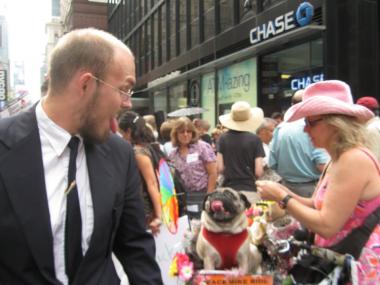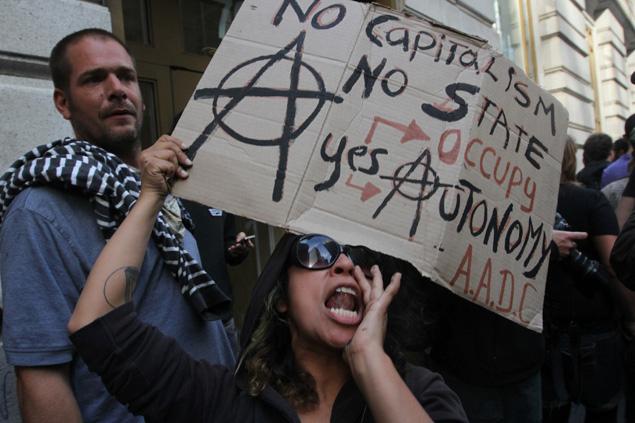
Funny day.
I went incognito as a worker in the financial district, and, slipping past a checkpoint, clicked my heels on the cobblestones plunked in front of the stock exchange.
One of my clients, who works in the tallest building above the stock exchange, was blocked from entry because he looked like a dirty hippie.
A cop impersonating an anarchist blew her cover.
And a News 1 reporter with an inch of make-up on his face was called out as a little bit of a fraud.
5 a.m.: Getting into disguise
I wake in the dark, put on a fitted black skirt, to the knee. I look at my dogwalking shoes – can I get away with wearing them? I can't afford to get arrested - I have to go to work at noon, and may need to do some running to evade the police. I reach for some pearls, step into heels. Then I realize I probably need to shave off that 4 months of hair on my legs, too.
Downstairs I run, to unlock my massive bike chain and skim down the street, pedal by pedal in my precarious heels. Soon I am flying over the Brooklyn Bridge as dawn rises, the pink financial district nearing by the millisecond.
7:30 a.m.: Trading places
We converge at the Staten Island Ferry terminal, and then, holding aloft flourescent green and pink signs reading "Wall Street, the business of extinction", and "System change, not climate change," the Eco Block sings and skips our way down the streets. We near the center of power, lickety split.
Many of us are in our Wall Street best, dressed as the 1%. We know that from all directions, dozens of us, if not more, will go undetected.
There on Broad Street looms the Stock Exchange, its pillars swathed with the broad striped flag. Leaning against a delivery van, a guy with a semi-scruffy look is taking photos of a checkpoint blocking the way to Wall Street.
It dawns on me that I know this guy. "Zach?" I venture. He puts his camera down and his photographers' look of concentration gives way. Yes, it's Zach, one of my former "clients", a nice guy who owns a nice chocolate lab named Umphrey. I was his dogwalker last year.
"I can't get to work!", he snickers.
"And where's that?", I ask.
"On the 30th floor, up there." He points to the building just adjacent to the Stock Exchange.
"What do you do?"
"I work in finance."
Probably because of his telltale beard, they cast him to the street like riffraff. Yet I actually sneak through a checkpoint nearby.
It's absurd. I don't have anything planned for this moment. I never thought they'd actually let me through. So I walk around the Police State that is the financial district this September morning, taking pictures of the long lines of Wall Street workers waiting to show their IDs at every juncture.
The police do our job for us – disrupting "business as usual."
10:45 a.m.: Cover, blown
Several hundred people sit crosslegged in a circle, watching a puppet show like children enthralled. Faces old and young, striking and plain, are all lit with wonder and whimsy, sharing in the magic. The puppets tuck themselves away, a different kind of sharing set to begin: a Speak Out.
Then someone introduces Cheri Honkala and Jill Stein of the Green Party, and Honkala steps up to speak at Bowling Green. Neither celebrities nor politicians are to be privileged to rise above or attract more attention than anyone else. Stein is welcome to speak, but so is everyone else.
Yet the Speak Out is not happening as planned. Behind-the-scenes confusion breaks out (except right in front of everybody). Time is running out.
Jill Stein's "handler" Kate, though young and lovely, looks pale, lined and distraught. She points at a woman standing behind Jill Stein, whose eyes are utterly obscured behind black bug-eyed hipster sunglasses. "This woman has been following us from engagement to engagement."
Without thinking, I reach out. One hand instinctively lights on the "disrupter's" tattoed shoulder. I ask what's wrong.
"I want to speak! Politicians are speaking, and I'm an anarchist, and I can't speak? Look at all these white women." I agree with her that that's not how things should go, that this is supposed to be a Speak Out, but things have gone screwy and time has stolen away. A nearby "friend" starts reasoning with her, but though she is being helpful, I don't trust her. She seems a bit rehearsed.
"Why are you smiling at me like that, patronizing me in that white-woman-way. Take your hands off me." I look away to face her companion, who is repeating that I am patronizing them with my smile. "I probably am," I admit, thinking that a different kind of entitlement is at work here. I look back at Stein, who is wrapping up.
Then she says it: "If you don't take your hands off of me right now...", the bug-eyed eyeless hipster-punk growls, as two puppeteers holding a banner look on.
"Take your hands off of me or I'll arrest… you."
She falls silent. She's said it as if she has said it many times before. I can't believe what I am hearing. And at the same time, I'm unfazed.
Her companion takes a deep breath.
"Ah, you're doing a great job!" I smile snidely. "Or actually, come to think of it, you just fucked up, didn't you, now?" And then, "I understand, you're 'just doing your job.'" Why do a lot of people become cops, I think, but because they felt powerless at some point in their lives. Threatened by my calm, or maybe genuinely triggered by my white, privileged, patronizing attitude, she's reverted to cop mode to regain control.
"She's not a cop," says her friend, perturbed. But she had, definitely, she had definitely said it.
"No anarchist has it in them to say, 'Get your hands off me or I'll arrest you.'" I said. "Not even anarchists losing their minds."
"She didn't say that," denies her friend, seemingly unconvinced by her own words. The bystanders, two puppeteers holding a banner, scoff.
"Yes," affirms one of the puppeteers resolutely, but with the objective air of a witness on a stand. "Yes, she did say that."
They drop it, don't fight. "Let's go," the "friend" shrugs at the undercover cop. "This is bullshit."
Never been so obvious and stupid as it was at that moment, my friends.
11:25 a.m. Unmasked
The people at Bowling Green have dispersed. People dressed as polar bears roll up dirty banners and head back to the storage unit, as everyone else convenes at Battery Park for the Action Spokes. The plaza in front of the Museum of the American Indian is close to empty.
A cameraman from NY1 sets up his shot, a shot looking out over a nondescript street with no significant backdrop save a lady with a pug-dog in a bicycle basket. The basket is a bed of fake flowers, and one of the synthetic, dusty, faded daisies crowns the pug's ears.
I am highly attuned to their decision to shoot after the action is over. They have such a fantastic range of visuals to work with – the steps of the museum, the park that is Bowling Green, the Charging Bull sculpture, but instead, they focus on the distant blur of a gaggle of people across the street, and a bleak empty space.
With a sandwich in one hand, I hike up my skirt and swing my leg over my bikeframe, flashing someone for sure. Heel by heel I position my feet precariously on each pedal and, curious, wheel slowly behind the anchor, within the camera's viewing range.
The anchor goes live: "People gathered here at 10 a.m. and nothing really happened, and then they left and went over there," he says with a shake of the head. Rolling by one-handed while munching my sandwich, I declare, "That's not true, there were 4,000 people here." (There weren't 4,000; forgive me, it is an impulsive moment.)
The cameraman's face goes sour as he wraps up the live shot. The sound guy comes over calmly, and agrees, it's true that sometimes some news-guys lie, but not this one. The anchor turns to me irate: "NOTHING happened here!"
"Sure, if you think that people taking a workday to assemble peacably and express their right to speak freely is 'nothing'."
"Ok but you're messing with me as I am trying to do my job! I'm trying to work, here!"
"What does it mean to work as a journalist, if the result does not approximate the truth?" I ask him. I try to offer him an excuse: "Look, I get it, your producers aren't interested unless there's a violent conflict of some kind, there are arrests..."
He interrupts me: "I worked for FOX, but that's not what's going on here."
"Alright, well our versions of the truth simply differ, then."
The dude has makeup so thick, his pores scream to breathe. The closer I get, the more they enlarge, crying out for air, gasping, "must. escape. this mask!" His warm eyes can't reconcile with that orange mask, as he insists he is one of the good guys, going after the truth. He does seem like a good guy. It's true.
September 18th. Waking up
We all sleep a few extra hours. I am sure the reporter, the cop and the financial sector worker do too. It was a tiring Monday for us all.
In my morning daze, I realize none of us were as we seemed that day. We all were incognito.
The made-up NY1 reporter, the disguised financial sector worker, the undercover cop hidden behind sunglasses so big they obscured half her face. And me, the radical dogwalker, wearer of sensible shoes, in heels.


